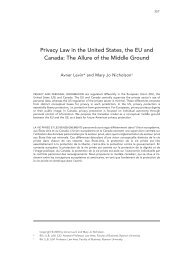Commentary on Fichte's “The Illegality of the Unauthorised ... - uoltj
Commentary on Fichte's “The Illegality of the Unauthorised ... - uoltj
Commentary on Fichte's “The Illegality of the Unauthorised ... - uoltj
You also want an ePaper? Increase the reach of your titles
YUMPU automatically turns print PDFs into web optimized ePapers that Google loves.
(2008) 5:1&2 UOLTJ 141<br />
<str<strong>on</strong>g>Commentary</str<strong>on</strong>g> <strong>on</strong> Fichte 151<br />
Having located Fichte’s work am<strong>on</strong>g <strong>the</strong> <strong>the</strong>ories <strong>of</strong> property comm<strong>on</strong><br />
at <strong>the</strong> time he was writing, it is now worthwhile to turn to an elaborati<strong>on</strong> <strong>of</strong> his<br />
view <strong>of</strong> <strong>the</strong> nature <strong>of</strong> copyright. Fichte’s article is divided into two secti<strong>on</strong>s. The<br />
first furnishes an argument that supports Fichte’s view. The sec<strong>on</strong>d parodies <strong>the</strong><br />
positi<strong>on</strong> <strong>of</strong> <strong>the</strong> utilitarian defenders <strong>of</strong> <strong>the</strong> reproducti<strong>on</strong> <strong>of</strong> books by means <strong>of</strong> a<br />
parable. The first secti<strong>on</strong> is divided into three sub-secti<strong>on</strong>s. The first deals with<br />
an a priori deducti<strong>on</strong> <strong>of</strong> <strong>the</strong> property right <strong>of</strong> <strong>the</strong> author in her book. The sec<strong>on</strong>d<br />
deals with an a posteriori argument, in which it is advanced that <strong>the</strong> principles<br />
proposed by Fichte are corroborated by <strong>the</strong> actual practice <strong>of</strong> authors. This<br />
secti<strong>on</strong> uses an intuitive appeal to current practice and norms to dem<strong>on</strong>strate<br />
that <strong>the</strong>y are c<strong>on</strong>sistent with <strong>the</strong> natural rights positi<strong>on</strong>. Finally, he dem<strong>on</strong>strates<br />
<strong>the</strong> incoherence <strong>of</strong> <strong>the</strong> utilitarian positi<strong>on</strong>.<br />
*<br />
5. PROOF OF THE EXISTENCE OF A RIGHT IN BOOKS<br />
5.1. The a priori Pro<strong>of</strong> <strong>of</strong> <strong>the</strong> Existence <strong>of</strong> Copyright<br />
Fichte grounds his investigati<strong>on</strong> <strong>of</strong> copyright in <strong>the</strong> newly emergent c<strong>on</strong>cepti<strong>on</strong><br />
<strong>of</strong> authorship outlined above. He begins with <strong>the</strong> propositi<strong>on</strong> that it is possible<br />
to own something which is not itself physical. As we have seen, this is a departure<br />
from <strong>the</strong> earlier view that all ideas exist in <strong>the</strong> public domain and that <strong>the</strong> author<br />
is merely some<strong>on</strong>e inspired by external sources to articulate <strong>the</strong>se ideas. Fichte<br />
argues that if he can dem<strong>on</strong>strate that a book c<strong>on</strong>tains n<strong>on</strong>-physical elements<br />
that are not part <strong>of</strong> <strong>the</strong> public domain, <strong>the</strong>n <strong>the</strong>re must be a property right in<br />
those elements.<br />
According to Fichte, <strong>the</strong> physical aspects <strong>of</strong> <strong>the</strong> book—<strong>the</strong> paper, ink,<br />
board and thread <strong>of</strong> which it is composed—are undoubtedly <strong>the</strong> property <strong>of</strong> <strong>the</strong><br />
publisher until <strong>the</strong>y are transferred to <strong>the</strong> buyer. The buyer <strong>of</strong> a book acquires a<br />
right to <strong>the</strong> physical book itself. This is because if <strong>the</strong> right to <strong>the</strong> physical material<br />
were not transferred, any use <strong>of</strong> <strong>the</strong> book by <strong>the</strong> purchaser without <strong>the</strong> permissi<strong>on</strong><br />
<strong>of</strong> <strong>the</strong> author or publisher would be a violati<strong>on</strong> <strong>of</strong> <strong>the</strong> latter’s right to physical<br />
integrity. However, it is not self-evident that <strong>the</strong> intellectual aspects are transferred<br />
to <strong>the</strong> buyer. There are two different intellectual aspects to <strong>the</strong> book according to<br />
Fichte. These are <strong>the</strong> ideas (what Fichte calls <strong>the</strong> “material” or “c<strong>on</strong>tent” <strong>of</strong> <strong>the</strong><br />
book) and <strong>the</strong> expressi<strong>on</strong> <strong>of</strong> <strong>the</strong> ideas (which Fichte calls <strong>the</strong>ir “form”). Fur<strong>the</strong>r<br />
to <strong>the</strong> right to <strong>the</strong> physical object, <strong>the</strong> buyer also acquires a right to <strong>the</strong> ideas<br />
c<strong>on</strong>tained in <strong>the</strong> book. Once expressed by <strong>the</strong> author, <strong>the</strong>se ideas become part <strong>of</strong><br />
<strong>the</strong> public domain and can be acquired by any<strong>on</strong>e who takes <strong>the</strong> time to study <strong>the</strong><br />
book and who has sufficient intelligence to understand <strong>the</strong> ideas c<strong>on</strong>tained in it.<br />
There are two reas<strong>on</strong>s that Fichte gives for why ideas become part <strong>of</strong> <strong>the</strong><br />
public domain. The first is that <strong>the</strong> acquisiti<strong>on</strong> <strong>of</strong> <strong>the</strong> ideas entails no interference<br />
with <strong>the</strong> thoughts or physical pers<strong>on</strong> <strong>of</strong> <strong>the</strong> author. Ra<strong>the</strong>r, <strong>the</strong> ideas are acquired<br />
through independent study by <strong>the</strong> reader. The sec<strong>on</strong>d is that, in producing <strong>the</strong><br />
book for public c<strong>on</strong>sumpti<strong>on</strong>, <strong>the</strong> author must have wished to communicate<br />
<strong>the</strong> ideas and share <strong>the</strong>m with o<strong>the</strong>rs. The desire to communicate is rooted in









